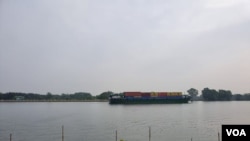Few images conjure the 1930s Depression like people standing in soup lines while farmers dump food they can’t sell. That is a tragedy Southeast Asia is fighting to avoid, though it is starting to happen in pockets around the world in the midst of COVID-19.
Supply chain disruptions, driven by the pandemic, meant that melons were being discarded in Malaysia and rice was left idling at the ports in Vietnam last month. Fears of protectionism prompted governments in the Association of Southeast Asian Nations to step in, calling a meeting where they vowed not to restrict food exports. The intervention is important for the rest of the world, too, which relies on ASEAN as a top supplier of certain rice, seafood, and produce.
“We note that the COVID-19 outbreak has drawn our attention on the immediate danger of food shortage and its adverse effect on nutrition, given a sudden spike in demand and disruption in supply chains,” the agriculture ministers of the 10 ASEAN members said in a statement.
They pledged to “refrain from imposing new export control, restrictions and prohibitions, tariffs and non-tariff barriers.”
Now they plan to conduct a joint study on how to ensure food security, with periodic reviews of the status of each member and a focus on securing rice, corn, and sugar.
Self-fulfilling prophecy
The challenge presents ASEAN with a classic economic quandary, whereby fear becomes a self-fulfilling prophecy if states don’t agree on collective action. Fears of food shortage can drive people to hoard, which in turn creates a food shortage.
Panic buying is only one of multiple factors behind COVID-19’s stress on the supply chain. First, consumers worldwide rushed to buy staples, as the virus forced many to stay home for weeks or months. Second, states became concerned this could decrease their domestic supply, so they issued export controls. That includes the suspension of egg exports from Thailand starting in March and rice exports from Vietnam and Myanmar. Third, these controls prompted concerns that states would retaliate with more controls.
“The beggar-thy-neighbor approach to closing your exports means that others will close off their exports to you,” said Ashok Kumar Mirpuri, Singapore's Ambassador to the United States, in a forum hosted by the Asia Society in April.
However, after the ASEAN meeting, food fears have eased. Vietnam and Myanmar lifted rice restrictions in May, while Malaysia and Singapore struck a deal to fix the bottleneck at their border, which is what had caused the unsold melons to spoil.
A fourth factor in the supply chain disruption is an accident: To curb COVID-19, governments banned people from traveling across borders, but that also made it harder for people to transport food. This was the case for Malaysia, which did not ban melon exports but restricted people’s movements, which had a knock-on effect for food shipments. The restrictions also make it hard for farms to get the workers and feed supply they need.
And finally, a fifth factor is simply that the pandemic exposed a disconnect between supply and demand. For instance U.S. farmers have dumped their supply of potatoes and milk because COVID-19 dried up demand from usual customers like restaurants. There is still demand from supermarkets, but that requires different packaging, so farms not set up to meet those requirements had to let their food spoil.
Zero-cost grocer
ASEAN leaders think they have avoided that last risk for now, but remain concerned that some will go hungry. Some states have gotten involved in food distribution, such as at quarantine centers in Vietnam and at workers’ dorms in Singapore. Companies donating food include Dole, which gave out fruit, food packs, and juice in Malaysia, the Philippines, Singapore and Thailand.
“Recovery is possible only when everyone in the community is healthy,” Aashim Malhotra, Asia Pacific vice president at Dole Packaged Foods, said.
Vietnam has experimented with other ideas, such as a “rice ATM,” a machine that dispenses free rice, and a “zero cost” grocery store, which lets the needy take five free items per person, such as noodles or bananas.
Former Vietnamese diplomat Ton Nu Thi Ninh said she hopes these ideas will continue after the crisis.
“The COVID-19 global pandemic is laying bare much of what is wrong with our societies,” Ninh, now president of the Ho Chi Minh City Peace and Development Foundation, said. “At the same time it is activating inherent goodness in many of us, stimulating relief and philanthropic initiatives.”





